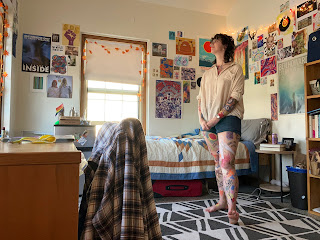Tangerine!
I loved this movie. I remember at first managing my expectations because the intro scene seemed like your typical low-budget indie film and the set-up seemed only semi-believable to me, but the moment the music started with Sin-Dee walking out of Donut Time and down the street, I was hooked.
I loved how the music varied so widely. There was some intense, bass-heavy bounce music, and some gentle, subtle classical, all strategically placed. Using both together made each one feel more significant. I also appreciated the never-static, always moving camera angles, fluid but also choppy, lots of cuts between moving shots, kind of disorienting at first until you adjust to it. That makes me think of how the Paris is Burning intro was edited and shot specifically from an outside perspective, like sneaking/stumbling upon this hidden, fantastical world. Tangerine is much different because it thrusts you right into the thick of it with no time to adjust, you just have to follow along. I think that has the effect of making the viewer part of the action--an invested participant, rather than a passive, detached outsider. I also liked how every new person/stranger was introduced with a casual conversation about something. Like people on the street, or the cops, or the family of the cab driver Razmik. I think it's cool that they all get their own story and that we meet them first before we learn how they are connected to the main characters. Another super small film nerd thing I was curious about was the title. I remember noticing oranges twice in the film, one was the air freshener in Razmik's car and I can't remember the other. If y'all had any thoughts about why it was titled Tangerine I'd love to hear that. Those are just a few of the things I liked about this movie.
Now, analysis. Mingus says of the femmes she grew up around that “Their gender was a challenge to the world they lived in that was trying to erase them”, and this makes me think of Sin-Dee and Alexandra who were protesting with their very existence. The fact that Alexandra existed was a challenge to the cops who misgendered her, used the wrong pronouns, and made fun of the situations they presumed she caused. Sin-Dee was a challenge to the exploitation Chester pushed on her. Even though he took advantage of her desire for proximity to whiteness, her very existence as a trans woman he needed in any way challenged his power as a white cishet man. Their relationship too, I thought, was incredibly powerful in a similar way. In Sick Woman Theory, Hedva said “The most anti-capitalist protest is to care for another and to care for yourself. To take on the historically feminized and therefore invisible practice of nursing, nurturing, caring". The act of care between two trans women, or two extremely marginalized people, is a direct challenge to the heteronormative white supremacist society that says that women like Sin-Dee and Alexandra are unworthy of care and protection. That solidarity and sort of radical love in the Hedva piece and in other articles has always been absolutely revolutionary to me, and her framing it in terms of how a capitalist system feeds off of a lack of responsibility for care particularly stuck with me. I hope we can continue to talk about this article and these ideas in the future of this class. I welcome any thoughts and questions.Thank you,
Madeleine




Hi Madeleine! I too have been curious as to why the film is called Tangerine. One thought that I have (and it's a bit of a stretch) is that Tangerine's have this protective outer shell but are sweet on the inside. Sin-Dee and Alexandra are tough and endure a lot, but they also have emotions and experience pain and happiness. So maybe their tangerine peel is the way in which they must protect themselves and the inner tangerine chunks represent the side that you don't see, the sweetness, happiness, and maybe some vulnerability. It's a bit of a stretch haha but it's been on my mind.
ReplyDeleteThis is super interesting!! Thank you so much for your thoughts, I love that idea.
Delete